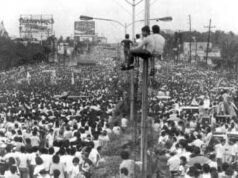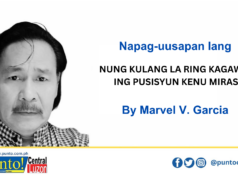Bear witness. This in brief is what Amina Mambuay and her husband Nathaniel have been doing for several years now. The couple is a member of the Sillah Dialogue Movement/Forum. Established in 1984 in Zamboanga, the Sillah Forum intends to cut down if not eradicate the prejudice and its concomitant animosity and actual deaths between and among Filipinos, especially those of Christians and Muslims. In the end, Sillah looks forward to a day where the elusive peace can finally descend in Mindanao, if not the whole country.
I met the couple in a Lasallian Conference/Workshop (Conversation, Conversion, Convergence towards a Culture of Peace as JUAN La Salle) in Bislig City Mindanao a couple of weeks ago. Self-effacing but intense, the couple has been doing lectures and workshops about Islam within the Christian communities for years at so much risk on their lives especially given the historical context of Christian and Muslim relation in Mindanao. The Muslim communities, on their part, are given a dose of Christianity.
Amina and Nathaniel are clear. These structured encounters and engagements between Muslims and Christians are not meant to convert people to Islam and vice versa. The activities are deliberately designed to create rooms and spaces for communication and dialogues instead of anger and violence borne out of ignorance to each other’s faith. Saying this is easy; doing it is another picture all together.
The “peace dialogues,” as they are called simply involve the provision of information about each other’s religion. Then, stories are brought out to cut open the prejudices, the information, the anger, and the experiences from participants. As the ways things are, these peace dialogues always come with a baggage from both and within each other’s camps. Amina and Nathaniel are so aware of this and does not mince words to clearly name if not bring them out in the open. Amina and Nathaniel would normally share their own experiences. In so doing, the fears, the anger, the prejudices and the experiences are not only given handles in order to navigate on them but are lent with credence and authenticity.
Amina discloses that the idea of a Muslim, let alone a woman, moving around the Christian communities, is not something that sits well with her own Muslim brothers and sisters, 75 percent of whom, according to her, can be considered fundamentalist. The Muslim communities on which Amina and Nathaniel operate have not only cast suspicious eyes but also throw verbal attacks and confrontations on Amina and Nathaniel. In many occasions, the couple find themselves being charged betrayers to their Islamic faith. Others would even accuse Amina of being a converted Christian dressed only as a Muslim. Some are convinced that Amina and Nathaniel are into talking peace because they are paid hacks and must have been financially benefitting from their activities such that they would not let go. But none of these vicious attacks show any signs that Amina and her husband would be cowed to retire any time soon.
The couple is equally engaging when asked about their experiences of being a minority in a Christian country. Aside from the simple acts of being denied taxi transportation (perhaps Amina’s most recent experience while in Manila) because she is clad in her Muslim wear, Amina once made a scene by demanding to speak to a manager of a department store because Muslims were being singled out for inspections.
These prejudices between and among Muslims and Christians are the stuff that Amina and Nathaniel are up against. Within their structured peace activities, prejudices are dealt, given names and are subjected to reflections and introspection so that Christian and Muslim participants alike can have better awareness of prejudices’ venomous existence. In so doing, peace is given a room. Amina and Nathaniel are the silent voices within the Muslim communities that despite being hurt, maligned and continuously being reduced to society’s margins are raising the ante for the long and protracted peace process in Mindanao.
From the couple’s vantage point, the highly inclusive political deals and posturing, massacres and perennial killings will not do anyone any good (other than the piling of dead bodies) for any serious peace process to happen in Mindanao. The road to peace must be thread by Christian and Muslim Filipinos discussing and talking about peace. Muslims and Christians alike must be given avenues to speak out their hearts and minds about themselves and about each other. The only way in fact to handle these prejudices, cruelties, humiliations and marginalization is to bring them out in the open and hope that in the process of hearing oneself and each other, people will come to the peace table with open minds and spirit.
If we ever think that peace in Mindanao, and the rest of the country for that matter, will happen because our government and public leaders are signing peace accords left and right, we are in serious trouble. True peace, the one that matters most, and the one that actually alters people’s lives, cannot be simply written in a piece of paper that says peace agreement. True peace, if ever we consider it essential, is written somewhere else. Like anything essential, most often, as the Little Prince would say, it is even invisible to the human eyes.
In the meantime it is so refreshing to note that Amina and Nathaniel are just like any other Christian mother and father: concerned about the welfare of their children (I overheard Nathaniel talking vibrantly about one of his children studying in UP-Diliman), can be half-amused and coy when commented on how they look (I once noticed Amina in a breakfast table without her veils and I jokingly remarked that I did not recognize her in an instant), and are worried about the increasing prices of commodities.
Yes Gabby, Amina and Nathaniel are right: the war in Mindanao must first be settled in our hearts and minds.
tobe_wtdpoor@yahoo.com
I met the couple in a Lasallian Conference/Workshop (Conversation, Conversion, Convergence towards a Culture of Peace as JUAN La Salle) in Bislig City Mindanao a couple of weeks ago. Self-effacing but intense, the couple has been doing lectures and workshops about Islam within the Christian communities for years at so much risk on their lives especially given the historical context of Christian and Muslim relation in Mindanao. The Muslim communities, on their part, are given a dose of Christianity.
Amina and Nathaniel are clear. These structured encounters and engagements between Muslims and Christians are not meant to convert people to Islam and vice versa. The activities are deliberately designed to create rooms and spaces for communication and dialogues instead of anger and violence borne out of ignorance to each other’s faith. Saying this is easy; doing it is another picture all together.
The “peace dialogues,” as they are called simply involve the provision of information about each other’s religion. Then, stories are brought out to cut open the prejudices, the information, the anger, and the experiences from participants. As the ways things are, these peace dialogues always come with a baggage from both and within each other’s camps. Amina and Nathaniel are so aware of this and does not mince words to clearly name if not bring them out in the open. Amina and Nathaniel would normally share their own experiences. In so doing, the fears, the anger, the prejudices and the experiences are not only given handles in order to navigate on them but are lent with credence and authenticity.
Amina discloses that the idea of a Muslim, let alone a woman, moving around the Christian communities, is not something that sits well with her own Muslim brothers and sisters, 75 percent of whom, according to her, can be considered fundamentalist. The Muslim communities on which Amina and Nathaniel operate have not only cast suspicious eyes but also throw verbal attacks and confrontations on Amina and Nathaniel. In many occasions, the couple find themselves being charged betrayers to their Islamic faith. Others would even accuse Amina of being a converted Christian dressed only as a Muslim. Some are convinced that Amina and Nathaniel are into talking peace because they are paid hacks and must have been financially benefitting from their activities such that they would not let go. But none of these vicious attacks show any signs that Amina and her husband would be cowed to retire any time soon.
The couple is equally engaging when asked about their experiences of being a minority in a Christian country. Aside from the simple acts of being denied taxi transportation (perhaps Amina’s most recent experience while in Manila) because she is clad in her Muslim wear, Amina once made a scene by demanding to speak to a manager of a department store because Muslims were being singled out for inspections.
These prejudices between and among Muslims and Christians are the stuff that Amina and Nathaniel are up against. Within their structured peace activities, prejudices are dealt, given names and are subjected to reflections and introspection so that Christian and Muslim participants alike can have better awareness of prejudices’ venomous existence. In so doing, peace is given a room. Amina and Nathaniel are the silent voices within the Muslim communities that despite being hurt, maligned and continuously being reduced to society’s margins are raising the ante for the long and protracted peace process in Mindanao.
From the couple’s vantage point, the highly inclusive political deals and posturing, massacres and perennial killings will not do anyone any good (other than the piling of dead bodies) for any serious peace process to happen in Mindanao. The road to peace must be thread by Christian and Muslim Filipinos discussing and talking about peace. Muslims and Christians alike must be given avenues to speak out their hearts and minds about themselves and about each other. The only way in fact to handle these prejudices, cruelties, humiliations and marginalization is to bring them out in the open and hope that in the process of hearing oneself and each other, people will come to the peace table with open minds and spirit.
If we ever think that peace in Mindanao, and the rest of the country for that matter, will happen because our government and public leaders are signing peace accords left and right, we are in serious trouble. True peace, the one that matters most, and the one that actually alters people’s lives, cannot be simply written in a piece of paper that says peace agreement. True peace, if ever we consider it essential, is written somewhere else. Like anything essential, most often, as the Little Prince would say, it is even invisible to the human eyes.
In the meantime it is so refreshing to note that Amina and Nathaniel are just like any other Christian mother and father: concerned about the welfare of their children (I overheard Nathaniel talking vibrantly about one of his children studying in UP-Diliman), can be half-amused and coy when commented on how they look (I once noticed Amina in a breakfast table without her veils and I jokingly remarked that I did not recognize her in an instant), and are worried about the increasing prices of commodities.
Yes Gabby, Amina and Nathaniel are right: the war in Mindanao must first be settled in our hearts and minds.
tobe_wtdpoor@yahoo.com




